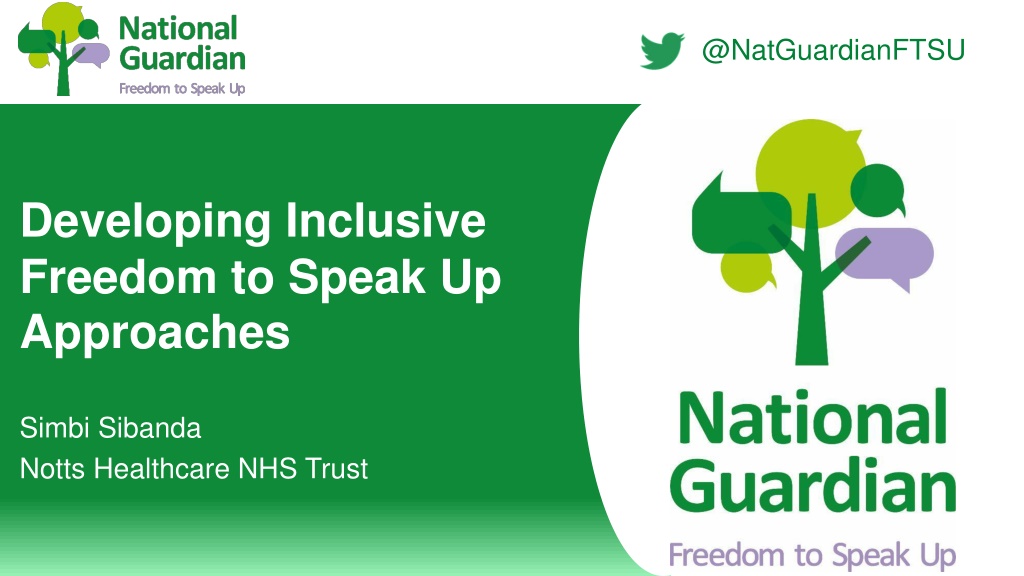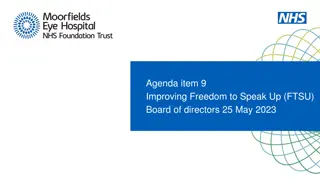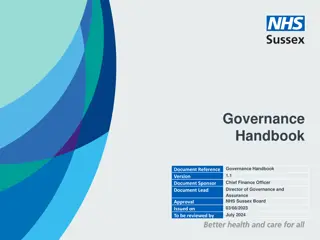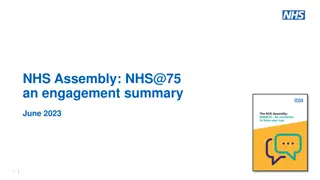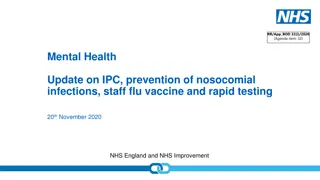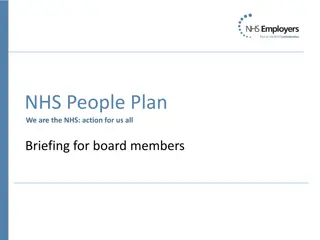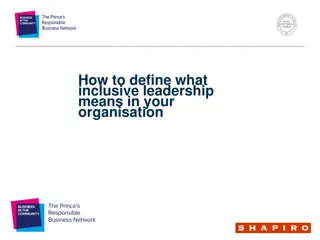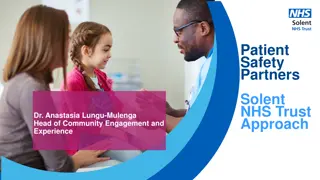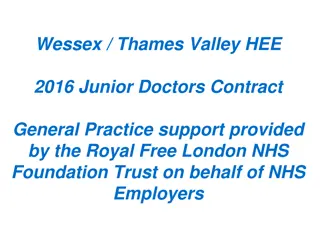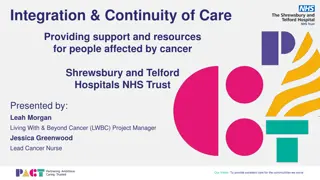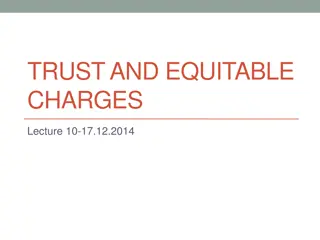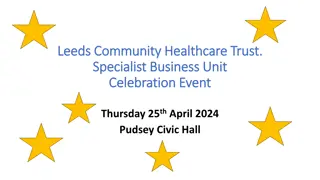Developing Inclusive Freedom to Speak Up Approaches at Notts Healthcare NHS Trust
Embracing a culture of speaking up is crucial for fostering communication and addressing barriers in the workplace. The initiative at Notts Healthcare NHS Trust aims to empower staff to voice concerns and promote a supportive environment for feedback. Through sessions like Kindness, Civility & Respect Week, the project focuses on enabling all individuals to speak up effectively, especially addressing challenges faced by specific groups like BME workers. By making speaking up a norm, the organization strives towards continuous improvement and inclusivity.
Download Presentation

Please find below an Image/Link to download the presentation.
The content on the website is provided AS IS for your information and personal use only. It may not be sold, licensed, or shared on other websites without obtaining consent from the author. Download presentation by click this link. If you encounter any issues during the download, it is possible that the publisher has removed the file from their server.
E N D
Presentation Transcript
@NatGuardianFTSU Developing Inclusive Freedom to Speak Up Approaches Simbi Sibanda Notts Healthcare NHS Trust
@NatGuardianFTSU Kindness, Civility & Respect Week Hosted by Nottingham City Hospitals with session contributions from System Partners 21- 28 September 2022 Please have your phones ready to access Menti at the end for the evaluation Developing Inclusive Freedom to Speak up Approaches 7425 9357 https://www.menti.com/alqdu2ci 6t8n
The Learning Outcomes for this session: Use feedback from the pilot project to . Consider how we can support a culture where everyone can speak up Identify some of the barriers that hinder speaking up Embrace the intermarriage between Speaking up, Kindness Civility and Respect.
Context: Can everyone Speak Up? Many staff find it difficult to challenge non-compliance, incivility, disrespect and many other issues that can get in the way at work - even with their close peers. Staff can be intimidated by hierarchy, by those they perceive to have more influence than them and indeed many other barriers. Supporting a culture where everyone is empowered to speak up and receptive to feedback is really important in our organisations. We need to empower all staff with the confidence and language to speak up when something is getting into the way of providing good care to patients. Making Speaking up business as usual - Our National Guardian, Dr Jayne Chidgey- Clarke recently pointed that speaking up is still not business as usual . In her recent interview with HSJ, Jayne stated there is still much to do; be it through the guardian route or any other route, it s still not business as usual across every organisation in the NHS. Research has shown that there are certain groups within our workforce which are more likely to face barriers when it comes to raising concerns/speak up. (Can we identify some of these groups?)
Background to the project In May 2021 NHSEI set out a proposal to work collaboratively with three pilot sites and other NHSEI colleagues to: raise awareness of FTSU with BME workers and build confidence in the speaking up process. Advise on how the FTSU guardian recruitment process can be more inclusive Understand some of the specific challenges that BME staff face to speaking up and what would make it easier for them to speak up Supporting organisations to develop an action plan for continuous improvement. Notts Health volunteered to be one of the pilot sites after undertaking a FTSU Board review with Advocacy & Learning team from NHSEI.
Approach Two x 2 hour workshops were held on 8 and 21 September 2021 (4 in total) one in the morning and the other in the afternoon. The workshops followed the same format for each session. Internal and external speakers attended at least one of the workshops. During each workshop a poll was undertaken and views on the following questions were sought: Q1: Who do you go to raise a concern about safety or other issues that impact your work: Q2: How confident do you feel that the concern will be taken seriously? Q3: What one thing should the organisation change that would give you greater confidence that your concerns are taken seriously? There were an overall total of 43 responses for all four workshops. The reason for such low response was people from external organisations could not access the poll
Data from poll What one thing should the organisation change that would give you greater confidence that your concerns are taken seriously? Clearer pathways of where to go with your concerns A more open and transparent approach to dealing with low level incidents Making it easier to speak up through independent processes/panel
Breakout rooms Participants were asked to self select a breakout room to discuss one or more of the following questions: Question A What would make it easier for you to speak up? Question B How could we make you feel valued as a person? Question C How could we improve confidence in staff speaking up? Question D If speaking up was working at its best in this organisation for BME staff what would that look like for you? Facilitators noted feedback and the main the main themes coming out of these discussions were then grouped as follows:
Top 3 from breakout rooms How could we make you feel valued as a person? up? What would make it easier to speak up? How could we improve confidence in speaking If speaking up was working at its best in this organisation for BME staff, what would that look like? Let s stop making speaking up a process, Speaking up aligns to our values let s make speaking up part of everything we do within the organisation. Let it become a custom and process. Promoting the various ways to speak up Having easier access to managers not being told they don t Creating greater allyship FTSU training a mandatory requirement FTSU part of management development Managers being visible and approachable and adopting a more open door policy Being treated with respect, listened to and receiving feedback Organisation to develop more of an understanding about microaggressions Focus on FTSU being part of management development Include FTSU in one to ones and supervisions Deal with historical and negative narrative
Main Themes Accessibility to FTSU arrangements, especially for evening workers. Anecdotal evidence suggests that majority of BME workers are evening workers and therefore FTSU arrangements should be strengthened so that evening workers understand how and who to speak up to and provide assurance that their concerns will be acted upon; Greater collaboration between FTSU, EDI and HR in sharing and analysing data Better feedback mechanism to assure workers that their concerns are being addressed More focus in supporting managers to understand FTSU, how to address and escalate concerns; FTSU to be included in one to ones and clinical supervisions; as well as regular included in team meetings Develop short term goals to make FTSU business as usual in the longer term Greater collaboration between BME network and other networks to support champions in understanding the needs of different protected characteristic groups
How could we make you feel valued as a person? Giving people a voice irrespective of grade and discipline. speak up and raise the profile of when people do great things More protection [support] for people speaking up Make sure that senior leaders are not part of the problems and the issues of maintaining a system of inequality. Organisation to develop more of an understanding about microaggressions and micro assaults BME staff tends to come from a culture where speaking up to hierarchy is not encouraged. It will take time to build Trust Process of escalating concerns within the organisation and the steps to follow if not addressed for instance a similar policy/process to bullying and grievances. Escalate issues with NHS England, regarding the level of racial abuse our staff suffer and yet there is no consequence for patients/staff who engage in this behaviour despite their being a zero tolerance policy in place Being treated with trust, honesty and certainty Being listened to and getting feedback Being treated the same regardless of banding Being treated in a respectful manner Managers being visible, approachable and adopting an open door policy
What is an Inclusive Speaking Up culture ? On a basic level Where everyone within the organisation feels confident to speak up without fear of reprisal. 7 elements of a healthy and inclusive speak up culture
Benefit - Retention of Workers All workers are affected by their environment NHS Staff Survey indicates 1/5th of the workforce are considering leaving the NHS The most consistent theme at NottsHC in speaking up is poor relationships with line managers and other colleagues , shared with FTSUG as reason to look elsewhere. What are the reasons workers leave our organisations? Do we ask ? Do we have a process for monitoring this information? Can we improve this ?
What can Senior Leaders do ? When it comes to developing Inclusive Speak Up Approaches, leaders set the tone. Following up on what workers need to do their job happily and effectively can encourage an open speak up culture, promote retention and above all improve patient care. By modelling the Trust values and demonstrating compassionate leadership. Effectively utilising Equality Impact Assessments (EIAs). Kindness, Civility and Respect can be effective when modelled from the top. Managers being visible and approachable and adopting a more open door policy Organisations to develop more of an understanding about microaggressions, incivility etc and how to deal with it. Speak up is a relational exercise that only works well if supported by leaders who walk the talk
What NottsHc is doing now Expanded Guardian resource, 2 FTSU Guardians Guardian visibility Diversity in champions recruitment Champions Development Ringfenced time for FTSU champions, 5 -7.5hrs per mnth Targeting seldom heard groups Posters, leaflets, email signatures Use of social media Working with Comms Working closely with Culture and Engagement Team, Workforce team, EDI, Staff Networks, NEDs, Senior leaders and other internal and external stakeholders. Triangulating & Using data to target support FTSU Managers Handbook Reporting bimonthly to People, Culture, Equality and Inclusion Committee The Trust board and chair are involved in FTSU matters
Thank you for joining the session Any Questions? Also feel free to pop your question in chats. https://www.menti.com/alqdu2ci6t8n
Kindness, Civility & Respect Week Hosted by Nottingham City Hospitals with session contributions from System Partners 21- 28 September 2022 Thank you for joining the session: Developing Inclusive Speak Up Approaches Please complete the evaluation Using your phones scan this code Developing Inclusive Freedom to Speak up Approaches 7425 9357 https://www.menti.com/alqdu2ci6t 8n
